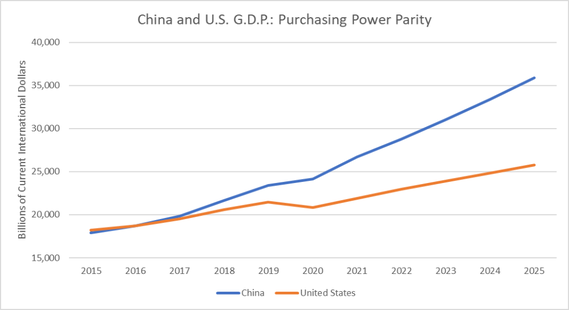From Dean Baker It is more than a bit annoying to hear reporters endlessly refer to China as the world’s second largest economy. It isn’t. It’s the world’s largest economy and has been since 2017. Here are the data from the International Monetary Fund. Source: International Monetary Fund. As the chart shows, China’s economy first passed the U.S. in 2017. It is projected to be more than 16 percent larger this year, and by 2025 is projected to be almost 40 percent larger by 2025. Purchasing power parity (PPP) measures of GDP are based on applying a common set of prices for all goods and services produced across countries. While it is difficult to measure accurately, most economists view PPP as being the better way to calculate GDP, since it reflects living standards and does not
Topics:
Dean Baker considers the following as important: Uncategorized
This could be interesting, too:
tom writes The Ukraine war and Europe’s deepening march of folly
Stavros Mavroudeas writes CfP of Marxist Macroeconomic Modelling workgroup – 18th WAPE Forum, Istanbul August 6-8, 2025
Lars Pålsson Syll writes The pretence-of-knowledge syndrome
Dean Baker writes Crypto and Donald Trump’s strategic baseball card reserve
from Dean Baker
It is more than a bit annoying to hear reporters endlessly refer to China as the world’s second largest economy. It isn’t. It’s the world’s largest economy and has been since 2017. Here are the data from the International Monetary Fund.
Source: International Monetary Fund.
As the chart shows, China’s economy first passed the U.S. in 2017. It is projected to be more than 16 percent larger this year, and by 2025 is projected to be almost 40 percent larger by 2025.
Purchasing power parity (PPP) measures of GDP are based on applying a common set of prices for all goods and services produced across countries. While it is difficult to measure accurately, most economists view PPP as being the better way to calculate GDP, since it reflects living standards and does not fluctuate with currency values. China does have four time the population of the United States, so it is still much poorer on a per capita basis.
The fact that China has a larger GDP than the United States is important for policy debates since many people seem to hold illusions are about the ability of the U.S. to influence China. While United States can take steps that will damage China’s economy, even the harshest measures will only have limited impact, and China will be able to take steps to overcome them through time. This is important background for debates on China policy.

